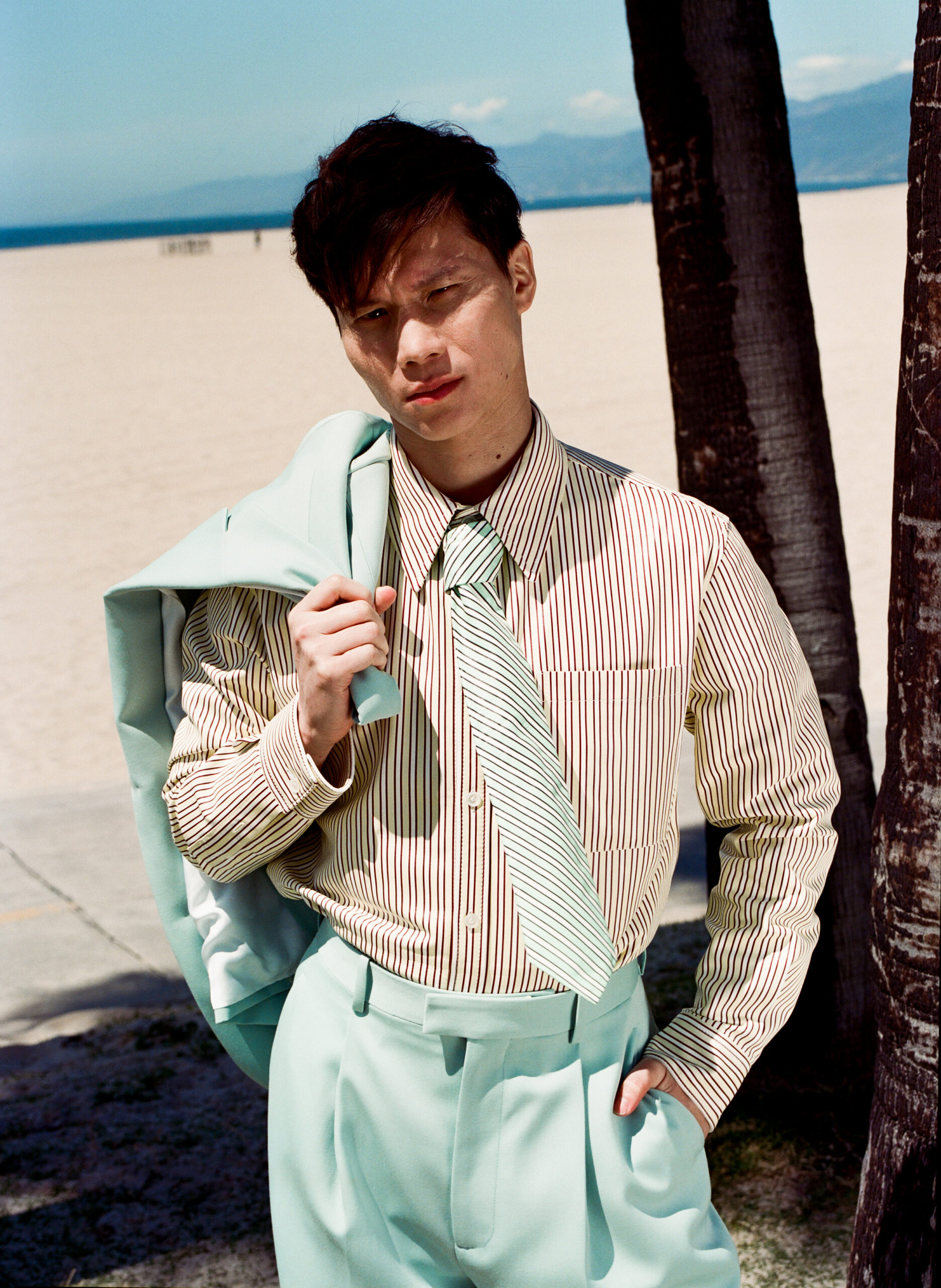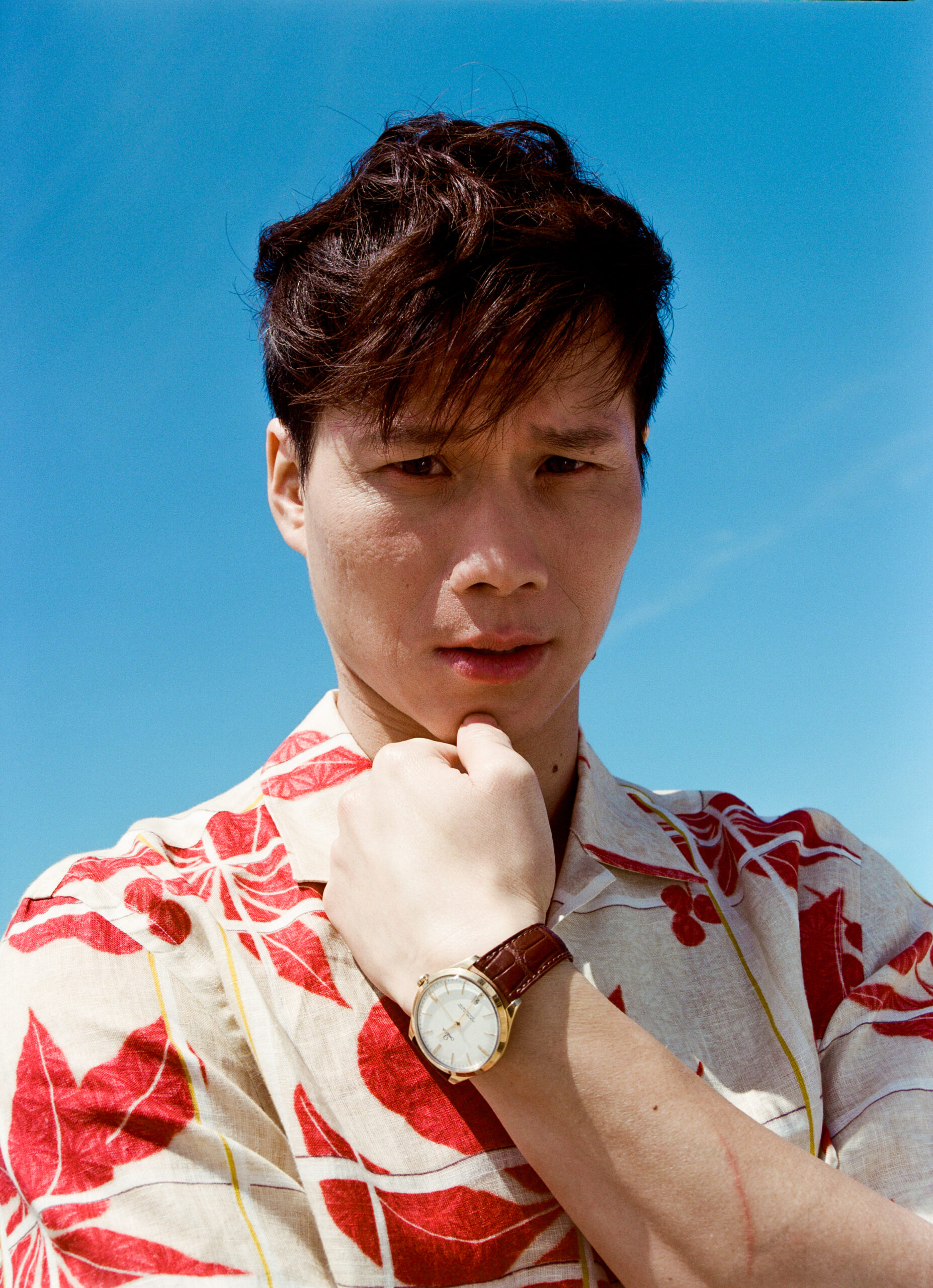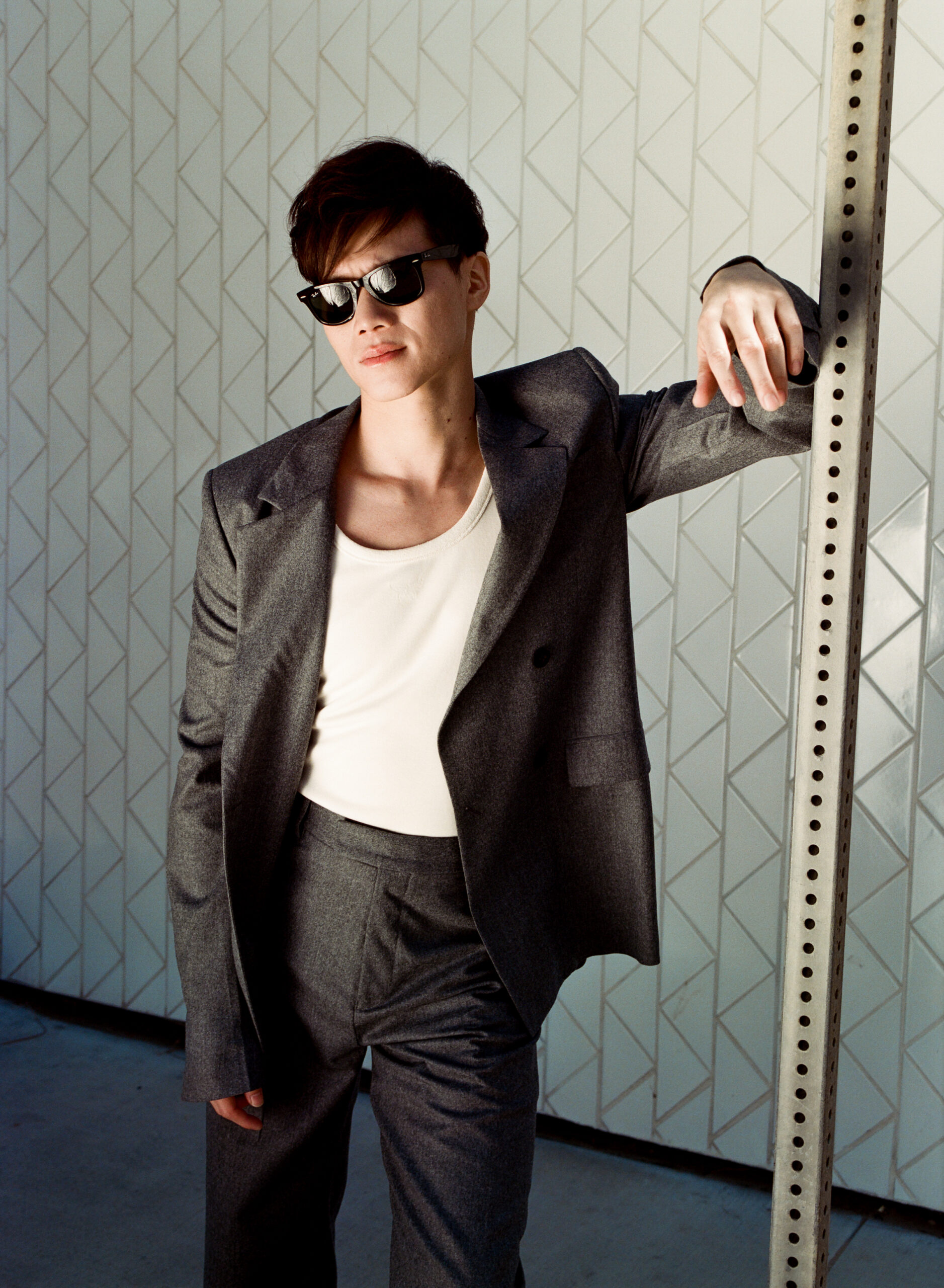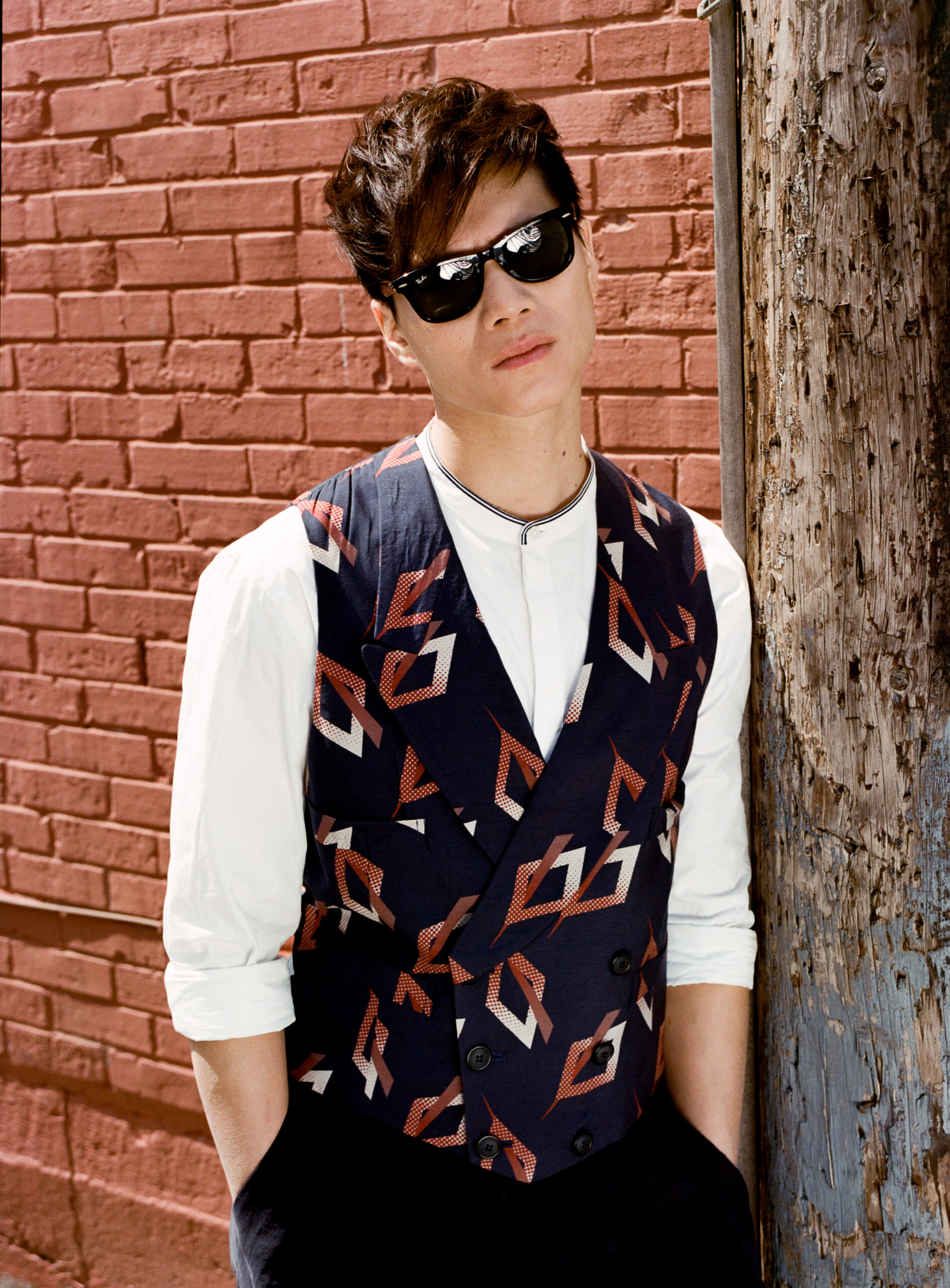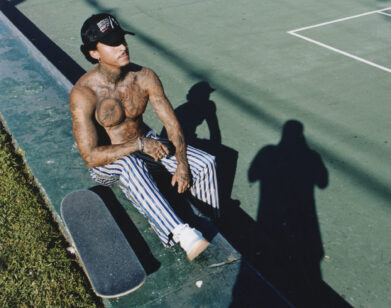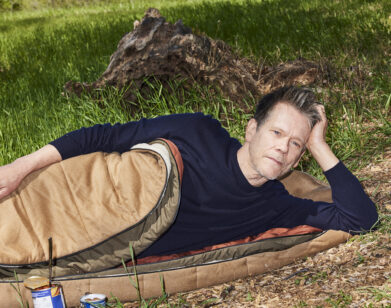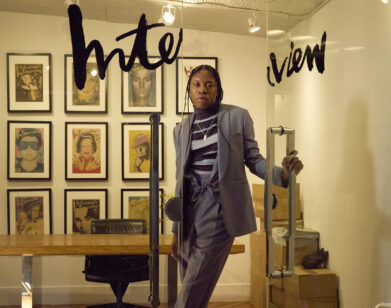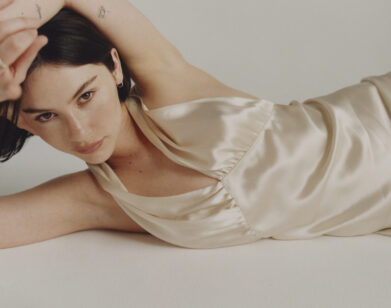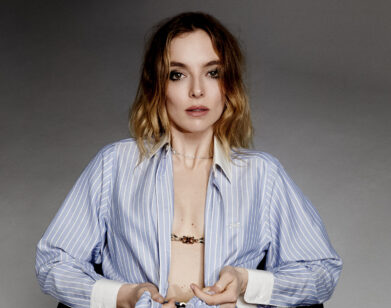BIG BREAK
“I’m Just Floored”: Hoa Xuande, in Conversation With Robert Downey Jr.
The Vietnamese-Australian newcomer and star of HBO’s The Sympathizer talks to his Oscar-winning costar about what went down after he landed the role of a lifetime.
———
THURSDAY 1:15PM APRIL 18, 2024 NYC
ROBERT DOWNEY JR.: Hey bro!
HOA XUANDE: Hey, Robert. What’s happening?
DOWNEY: Where do we find you now, you globetrotter?
XUANDE: I’m in New York, just sitting in this swanky apartment.
DOWNEY: So, I’m reading your reviews.
XUANDE: Oh yeah?
DOWNEY: “Xuande has flown under the radar in shows like Netflix’s live-action Cowboy Bebop,” “Gives just the chameleonic performance the character calls for,” “The Captain holds it all together in a remarkable turn as our lead tries to pinpoint his own identity,” “Xuande’s outstanding performance anchors the series as a future television classic,” “A star-making turn.” Over and over and over.
XUANDE: Crazy.
DOWNEY: I know you, brother. I know your passions, I know your commitment, I know what a crucible the entire auditioning process for this was—forget just getting the role, but actually having to do it. So now, having seen it received better than you might’ve been able to imagine, what is this feeling?
XUANDE: I’ve watched so many different stories that have moved me in a way that has made me change my perspective, made me want to change direction as a human being, made me consider my morality, my choices, things that I do in everyday life, right? And that’s really all I wanted to do when I pursued this career, to be able to have that impact on other people. And then when I read this book [The Sympathizer by Viet Thanh Nguyen], I thought it was an opportunity to have that effect from a Vietnamese perspective— telling stories that people haven’t heard before in this way. And so to be given that opportunity, and then to have these people and these outlets I’ve been reading for years receive my performance in this way, I’m just floored.
DOWNEY: You also know that your peers read these, and it’s funny—we do it for the love of it, we do it for the audience experience, but let’s not kid ourselves. It’s nice to have the people we know, love, and admire, whether we work with them or not, get a sense that we are now commensurate. I’m sure there’s part of you that is like, “Everything’s different and yet nothing’s changed,” because I know you, and you are the same dude who had all the hopes and dreams before this occurred. I’m just so happy for you, dude.
XUANDE: Robert, honestly, even back home, I’m getting messages from people I haven’t had contact with in the last 10 years, people who didn’t even know I was an actor. It’s been humbling to hear people say, “Wow, we didn’t know that you were capable of doing this.”
DOWNEY: And also, we all went to the premiere and got together and did this photo shoot at the Chateau with my dear friend Davis Factor, and seeing Fred Nguyen Khan and Duy Nguyen, who are actually good friends, and then watching you do these photo shoots with them and the rest of the cast, I felt like we captured a moment.
XUANDE: That was really beautiful, because I turned up expecting to have a final reunion before we launched this premiere, but it was really nice to be able to have Davis capture us the way that we were on set.
DOWNEY: By the way, Toan Le, our general, he was looking so sharp, dude. He had a Hollywood haircut, he was wearing a waxed jean jacket. I was like, wow! The very many exceptional women in this film—Vy Le, Sandra Oh, Kieu Chinh—tell me about your pride of being able to represent a more complicated portrayal of the Vietnamese experience in concert with these really gifted actresses.
XUANDE: Of course. So Ky Duyen and Kieu Chinh are really famous names within the Vietnamese community, and they’ve been on television as, I guess, the faces of the Vietnamese people in Hollywood for a long time. It’s nice to now know that they’re not just faces for the Vietnamese community. They’re on a show that’s going to be watched by millions of people across the world, and they’re going to have the ability to play characters that are deeper than just Vietnamese women onscreen. When I got an opportunity to meet them on set, it was a surreal moment because I’d heard my parents talk about them for a long time, and I didn’t have the same sort of affinity towards them, but I knew of them and what big stars they are. So it was cool to meet my parents’ stars, but I obviously understood the gravity of what it was like to work with them.
DOWNEY: I think the arc between you and Sandra is the heart of the story. Obviously you guys had great chemistry, but what were the daily ins and outs of that like?
XUANDE: We obviously get very intimate with each other. [Laughs] The thing is, it wasn’t very hard to do, because it’s so easy to fall in love with Sandra. She’s so warm and affectionate. I had to remind myself, “Hang on a minute, you’re the Captain. Don’t fanboy over her.” And I found myself doing that a few times. But that relationship was so easy to start, and we were able to play that really easily onscreen.
DOWNEY: And she really, from my perspective, cohosted the whole shoot, and also was the one character who’s kind of onto you, because of the intimacy. She’s like, “Hey, what is it that you’re not showing?” I want to say on a sidebar, I was also in New York and I got to see Enemy of the People and our boy Alan Trong just knocks it out of the park.
XUANDE: I’m seeing Enemy of the People tonight! His character in this show is very pivotal to how my character even acts in this show.
DOWNEY: He’s mercurial.
XUANDE: Yes. I’m really excited to see him tonight.
DOWNEY: I think you’re going to have fun. There’s no sitting where we are today if [The Sympathizer director] Park Chan-wook had not taken the helm of this project. I had my own experiences a couple times with Lord [Richard] Attenborough or Oliver Stone or Christopher Nolan, where you are given this cold-plunge crash course in all things cinema. I really feel that Director Park took you to task, and he never pulled any punches. He was very exacting on you, but the sense of pride that I could see he was feeling, knowing that intuitively he had made the right choice—can you talk a little bit about the arc of your relationship with him during the shoot?
XUANDE: When I stepped onto set for the first time and really got into it, I was doubting that I could carry this, that I could make the right decisions to tell this story. But in subsequent conversations that I’ve had with Director Park, he instills confidence but he doesn’t let you off the hook. He believes in you, and he expects a high level of performance and work ethic. He doesn’t necessarily always show it, but he does it in a way that inspires you, so you turn up every day trying to work harder because you know you can be better, and that if he chose you, he knows exactly how you fit into the frame of everything he wants to tell in this story. It took me a while to learn that, but once me and him got going, it was a dance.
DOWNEY: By the way, so many people are calling me up and crushing on you. You’ve become a bit of an object of affection. I think Director Park saw that you were very transparent and honest about your doubt. His bet was to get you to bring it into the character, because it’s perfect for what we’re trying to portray. And also, switching back and forth between English and Vietnamese and the amount of heavy lifting you did was crazy. So I want to know, at what point in the shoot were you at an all-time energetic dispositional or confidence low? Beginning, middle, or end?
XUANDE: We shot a lot of the reeducation camp stuff towards the end, and I was a ghost by then. You probably saw me on some of those last few days of shooting in L.A. before we shipped off to Thailand. I remember you turning to me and being like, “Geez, don’t fade on me, brother, just hang in there. You’ll be in Thailand soon.” And I was like, “I’m getting there, Robert. I’m getting there.”
DOWNEY: [Laughs] Man, we had some fun, though.
XUANDE: I found it really fun to just be given the opportunity to go toe-to-toe with you, Robert.
DOWNEY: By the way, I remember back in the late ’80s when I was told that I would be on the cover of Interview. I was like, “Oh my god, I’ve arrived.” Because back then, you only got the cover if you were Matt Dillon or Madonna. Interview has always been, and remains, the top of the tree when it comes to an artist-born, artist-run publication.
XUANDE: Do you remember who interviewed you?
DOWNEY: I think back then they had journos do it. The photographer was a gal named Karen Kuehn. I framed the cover and I have it out in the Hamptons, and I’m thinking that there will come a time when you’re looking back on this moment, where basically a lifetime’s worth of hopes and expectations and honest-to-goodness hard work pays off. So now that you’re basking in the afterglow of this project, where do your desires go?
XUANDE: I would love to potentially pick up a second season, but we’ll see what happens there.
DOWNEY: Your phone’s going to be ringing off the hook. Oh, by the way, it was Kenneth Turan, who’s one of our great journalists, who interviewed me.
XUANDE: Were you nervous?
DOWNEY: I don’t remember any nerves at all, but I could have been slightly medicated.
XUANDE: [Laughs]
DOWNEY: Are you taking a break or are you happy to get right back to work?
XUANDE: I guess I’m seeing what happens, and I obviously would love to work on another project that I’m just as passionate about. But obviously, Robert, watching Oppenheimer recently and seeing you kill the awards game, Christopher Nolan is someone I’ve always looked up to. Denis Villeneuve. Arrival still has a huge hold over how I think about storytelling. I’m looking for projects that I can have thought-provoking conversations about, but look, I’ll take whatever comes my way right now.
DOWNEY: Remember too, sometimes you have these seminal experiences and then the realization dawns on you, “Oh my god, I can’t just expect to go from one behemoth to another.” However, many doors that may have felt glass ceiling–esque have been shattered. So I want to fully encourage you to say that none of this happened by accident, my dear compatriot, and I feel like the best is yet to come. I encourage you to dream big.
XUANDE: Thanks, Robert. I’m very aware of what the opportunities I’ve been given right now are, but I’m also very cognizant of the fact that I’ve had so much help along the way.
DOWNEY: If you had to give a shout-out to three folks who were integral to you winding up where you find yourself today, who would they be?
XUANDE: I’ll name and shame them.
DOWNEY: Yeah, come on, give me something.
XUANDE: Well, you’ve met my friend Dacre Montgomery before, who is one of the stars of Stranger Things.
DOWNEY: Oh, yeah.
XUANDE: He’s been there through dark times, throughout this whole journey, so I’d be remiss to not name him. I have another friend back home who’s been a part of this, even helping me with this audition, and he was on the phone with me while I was shooting this thing every day. Rory O’Keeffe.
DOWNEY: Loved meeting him! And by the way, Dacre is such a rock star. Give me another.
XUANDE: Stephanie Panozzo, who is another drama school friend that me and Dacre are in the same circle with. I’ve leaned on her, she’s leaned on me. And she has, again, been through the depths of my despair.
DOWNEY: Beautiful. Well, bro, I think there’s an embarrassment of riches here. I know you’re coming out to L.A. I’ll be here. I’ll swing by. We’ll hang out in Venice.
XUANDE: Cool, yeah!
DOWNEY: To be continued.
XUANDE: To be continued.
———
Grooming: Anna Bernabe using Weleda and Hairstory at Kalpana
Fashion Assistant: Jake Westmore
Fateful decision by Director Park.

